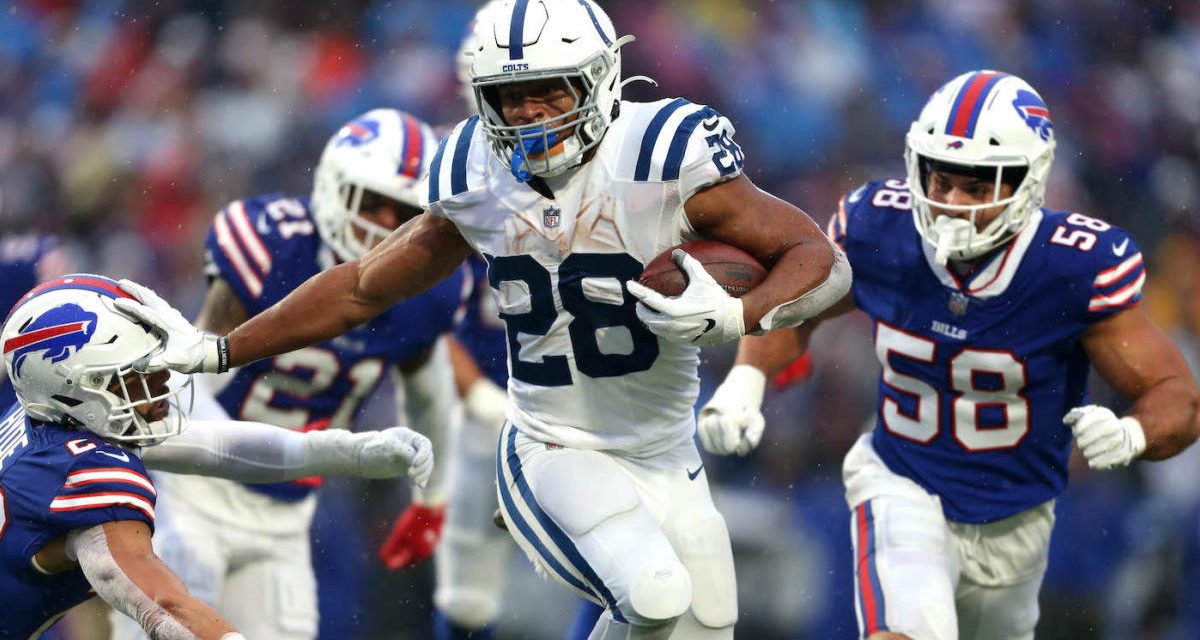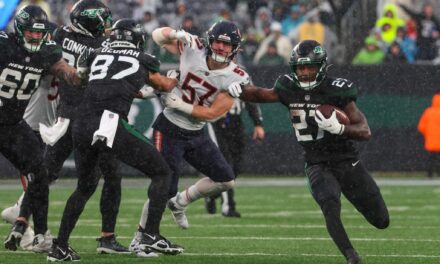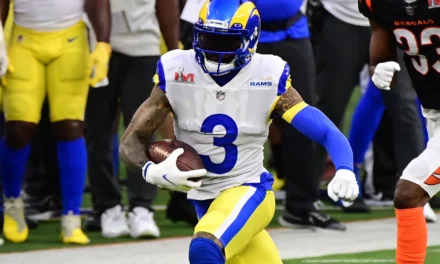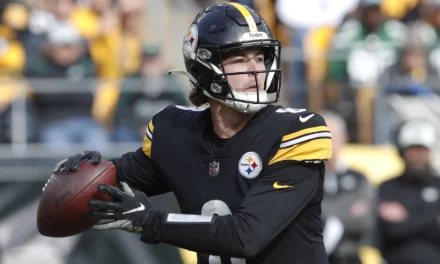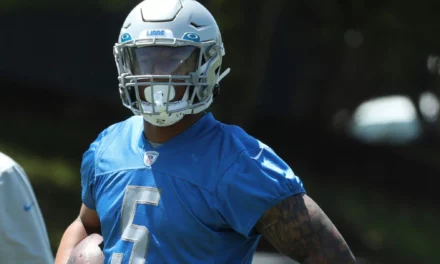A wise Douglas Horton once said, “If you love something let it go free. If it doesn’t come back, you never had it. If it comes back, love it forever.”
And so here we are, the 2021 fantasy football season has come and gone, let free to rest in the football annals.
Like any typical season, there was the balanced blend of highs and lows such as finding a shiny diamond in the rough (Leonard Fournette winks), hitting on your first-round pick, and then the injuries, the busts, getting owned by that auto-drafted team.
We’ve grown accustomed to it all. We’re pros, and yet, we adore the game just the same. On top of the standard challenges fantasy football presents, there was an ever-present thorn in the side of 2021, akin to last season — the mounting reserve/COVID-19 list.
Though, even more so than last year, 2021 felt awful. It dug deeper and deeper and mercilessly took away our key players and sucked the soul out of our teams. This was not an easy season by any means – unless you drafted Jonathan Taylor and in that case, well, it must’ve been nice.
It was headlined by hardship and great frustration. There were the crushing injuries that came before the season kicked off in Cam Akers, J.K. Dobbins, Gus Edwards, Travis Etienne, Michael Thomas, and Irv Smith Jr. Then the players, who were injured in-season like Saquon Barkley, A.J. Brown, Chase Edmonds, Derrick Henry, Kareem Hunt, Julio Jones, Christian McCaffery, and Robert Woods.
The unfortunate absences of these difference makers, along with the player-gobbling COVID-19 list, gave us fantasy football players a season to remember.
Of course, for all of the wrong reasons – again, unless you drafted Jonathan Taylor. Oh and Cooper Kupp too. Alas, we must do what we fantasy players do best. We must shift our collective gaze and move on. Fire the 2021 fantasy season into the sun, make sure it never comes back, turn the blindest of blind eyes, and bring on 2022, baby!
Note that this 2022 fantasy football first-round mock draft is done in a one QB PPR format.
1.01 Jonathan Taylor
Many anticipated a breakout sophomore campaign for JT, and oh boy did he deliver. The former Wisconsin Badger tallied the fourth-most rushing yards in a single season since 2010. He also broke the record for most consecutive games with a rushing score in a single season with ten.
Then to show off, Taylor led the NFL in 10, 20, 30, 40, 50, 60, 70, and 80 yard rushes. In simple terms, he’s an absolute madman running behind one of the top offensive lines in football, with the utmost trust of the coaching staff.
His skillset and build warranted the number of touches he saw in 2021. It would be silly for Indianapolis to not give Taylor a similar workload again. After all, the Colts were 9-1 when their superstar rushed for 100 or more yards. He does so much so well and everyone knows it.
He’s like the perfect ice cream sundae. He comes with all of the necessary toppings, but also provides some extras that put him over the rest of the competition — M&Ms, strawberries, marshmallows, you name it. There’s nothing more you can ask for in a running back. The cherry on top is his dash of receiving volume.
He has yet to reach the Alvin Kamara or Christian McCaffrey receiving level. But who’s to say he can’t? Therein lies the beautiful thing about Taylor, he’s just 22-years-old and will only get better.
1.02 Christian McCaffrey
A commonly asked question is, “Do you want the good news or the bad news first?”
I’ll take it upon myself to supply the bad news first — McCaffrey has started just 10 of a possible 33 games over the past two seasons. There were three games this season where he played less than 50% of the snaps, and in 2020 he appeared in just three games total.
All of this is coming from a guy who in his first three seasons was the staple of health. Now for the good news, there have been seven games since 2020 in which McCaffrey has played at least 50% of the snaps and in those instances, he’s averaged 27.7 points per game. That’s an average 7.1 points greater than Derrick Henry’s 2,027-yard, 17-touchdown mega 2020 season and 5.8 points greater than Jonathan Taylor’s 2021 season.
The only active player to top that average throughout a full season is McCaffrey in 2019 (29.4 ppg). It would be ridiculous of us to forget just how good McCaffrey is and let him slip down draft boards. It’s not incredibly farfetched to believe that an average in the neighborhood of 27.7 is attainable for him in 2022.
1.03 Derrick Henry
King Henry finished the regular season ninth in rushing yards and sixth in rushing touchdowns, despite his last game being on Halloween.
Henry, aka the entire Tennessee Titans’ offense, averaged 24.4 points per game in his eight appearances this past season. That’s 2.5 points greater than RB1 Jonathan Taylor. Me saying Henry was the entirety of the Titans’ offense isn’t meant to be a jab. It’s a simple truth.
In the eight games with an active Henry, Tennessee averaged 28.4 points per contest. Without the King, the Titans only averaged 21.3 points per game. For reference, 28.4 points per game would’ve made for third-best in the NFL, while an average of 21.3 would’ve made for 20th.
The reliance on the big bruiser was and will continue to be jaw-dropping. It’s also what makes Henry the pick here at three. His 27.38 rush attempts per game are good for first all-time. Even in a PPR format, it would be asinine to see him outside of the top five picks. The sheer greatness of his volume is what fuels Henry’s status as a top-tier fantasy back.
1.04 Austin Ekeler
2021 was the perfect example of “out with the old and in with the new” in Los Angeles. The Chargers let go of Anthony Lynn and Shane Steichen and were replaced by first-year head coach Brandon Staley and offensive coordinator Joe Lombardi.
New players came into the fold as well when Chargers GM Tom Telesco snagged top offensive line free agents Matt Feiler and Corey Linsley and drafted Rashawn Slater in the first round of the 2021 NFL Draft. The entire offense took a step forward as a result. Justin Herbert showed improvement, Mike Williams may have earned himself a new contract, Keenan Allen was dominant, and Austin Ekeler was fantastic.
Ekeler set personal bests in touches, rushing attempts, rushing yards, rushing scores (by freakin’ nine), and tied his career-high in receiving touchdowns. More notably, he was given a dramatic increase in scoring opportunities. In 26 games over the 2019 and 2020 seasons, Ekeler saw 53 red zone opportunities. In 16 games this past season, the veteran running back had 59. Ekeler now finds himself under a coaching staff that understands his abilities and will prioritize placing him in fruitful spots.
Do not be shocked if his touchdown total drops because 20 is a difficult figure to maintain. But what should be able to be relied on with certainty is the volume Ekeler is again headed for.
1.05 Cooper Kupp
In Fantasy Football Land, a magical place of running back dependency, it can get tricky when drafting a wideout in the opening round. In 2020, it wasn’t uncommon to see the near-unanimous WR1 Davante Adams go in the top half of the first round. Yet, he was also seen in the late first or the early second. Kupp may follow suit.
Where the first receiver goes off the board is mostly dependent on how worth it would be to pass on the more coveted running back position. Wideouts are incredibly plentiful in every round of drafts, but maybe Cooper Kupp is worth it.
From the jump, Kupp established a rapport with Matthew Stafford that saw him record less than ten targets just three times all season. His target share, red-zone target share, yards after the catch, and touchdowns all paced the NFL. Kupp is going to demand constant volume. He’s going to make the most of his targets, he’s going to score, and he’ll do so often.
With Robert Woods’ return date from injury unclear and Odell Beckham Jr.’s future up in the air, Kupp may see increased targets this upcoming season. 2021 was miraculous for the wide receiver, who was generally a fourth-round pick. We’d be wrong to doubt him again. Cooper Kupp may have the greatest positional advantage in all of fantasy football. It’s not like he scored 95 more points than WR2 Davante Adams.
1.06 Najee Harris
I understand that it’s early and certainly subject to change, but after those first five guys have gone off the board, we seem to have entered the range of “wow, there’s a ton of viable candidates at this spot.”
Taylor, McCaffrey, Henry, Ekeler, and Kupp represent tier one. And after a little deliberation, I hereby elect Najee Harris President of ‘tier two’ with the sixth overall pick. The rookie sensation hit the ground running (and receiving) in 2021 and showed the makings of an elite fantasy back.
Najee Harris just won (or lost) so many fantasy championships ????
(via @NFL)pic.twitter.com/HkUu9797o0
— B/R Gridiron (@brgridiron) January 4, 2022
He was entrusted with what few rookie running backs are nowadays — an unadulterated opportunity. His 307 rushes and 94 targets ranked second and first among all running backs.
The only rookies to have recorded a combination of at least 300 total touches (as of recently) are James Robinson with 240 rushes and 60 targets, Saquon Barkley with 261 and 121, Kareem Hunt with 272 and 63, Leonard Fournette with 268 and 48, Ezekiel Elliott with 322 and 40, Jordan Howard with 252 and 50, Eddie Lacy with 284 and 44, and Le’Veon Bell with 244 and 66.
Harris’ rookie season was extraordinary. But for as appealing as he is, his situation isn’t flawless. The Steelers have lost running back-friendly Big Ben to retirement and possess a subpar o-line. Pittsburgh does own six non-compensatory draft selections with one in each of the first three rounds.
Here’s hoping they’ll rebuild the trenches and get a quality quarterback in the offseason. With those outcomes, Harris’ potential is astronomical.
1.07 Alvin Kamara
2020’s RB1 had a different season than he’s accustomed to. Despite playing in 13 games, Kamara set a career-high in rushing attempts (240), but he recorded career lows in yards per carry (3.7) and receptions per game (3.6).
Interestingly enough, six of his seven career 20+ attempt games came this past season. It has to be assumed that the underlying cause for Kamara’s uncharacteristic season was New Orleans’ lack of offensive identity during a tumultuous season. The Saints trotted out four different starting quarterbacks. Their offensive line, often revered as one of the best, was battered and bruised, and Michael Thomas never logged a snap.
It’s never easy to succeed on a team that itself is devoid of consistent success. Just ask Saquon, he knows. 2021 was Alvin Kamara’s “How to Play on a Mediocre Team 101” course. What is paramount is keeping in mind who Kamara is — a five-time Pro-Bowler, 2017 offensive rookie of the year, and a two-time All-Pro second-teamer with four-straight 80+ catch seasons.
2021 was not a season of regression — it was a season of complication and misfortune. Kamara finished this season as RB8 with 18.1 fantasy points per game. He passed that entry course with flying colors. His draft status is more of a Saints problem than a Kamara problem at this point. If New Orleans can right the ship, and we should believe they can, considering their pedigree, Kamara will again thrive and boast tremendous upside.
1.08 Javonte Williams
Oh boy, am I excited for what could be in store for Javonte Williams next season! There’s a good chance he presents true workhorse production throughout 17 games. That’s quite the tantalizing thought. However, this reality hinges on Melvin Gordon’s departure or retention.
Gordon toted the pigskin 203 times in this past season. Williams also had 203 carries. Though their respective stats would suggest these two backs were neck and neck, that wasn’t the feeling league-wide.
Very few times have I ever noticed such a clamoring for the “freeing” of a running back in a 50/50 split. #FreeJavonte is a movement. The desire to see Williams as the go-to guy was undoubtedly earned, but it was disappointing to see him in that role just once.
In Week 13 against Kansas City, Williams delivered a masterclass of 178 total yards (29 touches) and one touchdown, with the geezer Gordon out of the fray.
Williams played 78% of the snaps that night but never exceeded 59% in any other game. Admittedly, it’s risky to slot a second-year player in the first round of a draft with just one workhorse game under his belt. Although, that game in Kansas City was pretty telling.
With regularity, he was extending plays and evading defenders. It seemed that Williams never went down on first contact. Just imagine what this guy could do when given the reins.
1.09 Joe Mixon
Cincinnati’s offense grew leaps and bounds this past season. They went from a bottom-of-the-barrel offense to one that can contend in any shootout. Joe Mixon was arguably the biggest beneficiary. Mixon racked up career bests in touches (334), scrimmage yards (1,519), and touchdowns (16).
Furthermore, his 50 red zone opportunities ranked fourth on an offense that was successful and explosive. Cincinnati is an offense, where all of its parts are hot commodities, with Mixon serving as the steady force. He’s the one at the goal line finishing drives and getting all of the carries. There’s a very real possibility Mixon is the workhorse on the top offense in the NFL next year.
But with Cincy’s passing offense being the one selling tickets and getting clicks, Mixon may enter the season underlooked and come at a value. What holds Mixon back a bit is his tame receiving production. Out of the guys above him in this mock, Taylor and Henry are the only ones comparable in that area. Everyone else has the edge on the 25-year-old running back.
However, maybe backup Samaje Perine, who drew 31 targets this past season, won’t be retained, and Mixon picks up the majority of those vacated targets.
1.10 Dalvin Cook
Cook was the unfortunate recipient of nagging injuries all year. He missed four games (one due to hitting the Reserve/COVID-19 list) this past season, none of which was back to back. Injuries have been his single drawback during his career. Cook’s recurring shoulder injuries will never get any worse than it already has because it’s put a detrimental damper on his stock.
It wouldn’t be without hesitation to draft Cook in the top half of drafts this offseason. On the bright side, Cook was healthy enough to be given 20 or more carries on seven different occasions, in which he averaged 21.3 points per game.
The knock against him has little to do with his ability. His talent is overwhelming and special, but his ever-developing injury past is also impossible to ignore. Regardless of who lines up on the offensive line or who calls the plays, Cook will perform when active. But it would be irrational to not temper expectations when drafting him. Being wary and cognizant of who Cook is, or who anyone is for that matter when making a selection is important. Hopefully, Cook will be able to recover during the offseason and have a bounce-back 2022 season.
1.11 Davante Adams
Let’s get it out of the way — Aaron Rodgers and Adams may not be in gold and green next year. I’m going to operate under the assumption that they will be. Adams, like always, had a dominant season where he set personal records in catches (123), yards (1,553), and first downs (84).
The man had seven fewer touchdowns than he had in 2020 and recorded 14 fewer points. In every aspect of what it means to be a receiver, Adams is the best or close to it – the same can be said for Rodgers in the quarterback demographic.
Adams went over 30 fantasy points six times (same as Kupp) and never below ten points. He embodies security and has a fair chance of going nuclear in any week. The star wide receiver is the perfect late first-round pick, especially this upcoming season with the breakouts of Ja’Marr Chase, Justin Jefferson, Kupp, and Deebo Samuel. I wouldn’t want to be the person to pass on the dude who is first in target share, top three in red-zone targets, top five in yards after the catch, and top six in touchdowns over the past two years. He’s only 29 years old and showing zero signs of slowing down.
1.12 D’Andre Swift
Swift is a baby Ekeler. They have similar builds, the same 40-yard dash time, similar skill sets, and career averages that resemble one another. The one glaring difference between the two is that one plays on the flashy Chargers and the other plays on the lowly Lions.
Any logical person would be chomping at the bit for at least one slice of Chargers fantasy pie right? The same can’t be said with such assurance for Detroit.
However, Swift is the big exception. In the ten games he played from Weeks 1-11, the ex-Georgia Bulldog put up a league-winning 18.5 fantasy points per game. Swift managed to hit paydirt six times and proved to be a threat in the receiving game during that stretch.
I don’t care who you are, finishing tenth in RB points per game on the Lions is impressive. Ironically enough, Detroit’s offensive coordinator was Anthony Lynn. The same guy that hardly let Austin Ekeler loose in years past. Not sure if Lynn thought this was some sort of sick joke, but Swift started just four games all season. Meanwhile, veteran Jamaal Williams had 601 rushing yards and started in 11 games.
For as frustrating as this split is, we have to be fair and remind ourselves that the Lions are very young, with a lot of cap space, and possess an enviable haul of draft picks. They’ll only improve from here. Swift is going to see more than the 78 targets and 151 rushes he’s coming off of this past season.
[Photo courtesy of Joshua Bessex/Getty Images]

